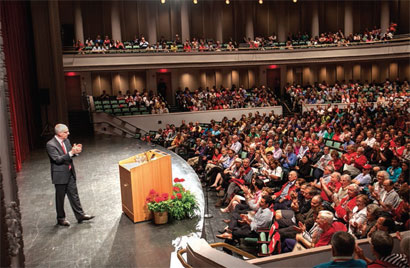What is it that makes Cornell so unforgettable? As I listened to alumni at Reunion 2013, it became clear that the Univer – sity’s magic is some combination of outstanding faculty, extraordinary students, wonderful facilities, and opportunities to grow as human beings through activities outside the classroom. Alumni especially remember the professors who awakened an interest, ignited a spark, and set them on their life’s path.
By virtually every measure—works published, awards received, students inspired, global challenges addressed—Cornell faculty today are at the top of their game. But, like all of us, they are getting older. A decade ago, roughly 30 percent of the faculty were fifty-five or older. By last fall, more than 43 percent were fifty-five or older, and many of them were past the age of sixty-five.
We are making faculty renewal our first priority as we prepare for the sesquicentennial, and during the past two years we have hired roughly 320 faculty. Some of our new professors are rising stars; others are distinguished scholars who left senior positions elsewhere for the exciting opportunities available at Cornell. All of them are setting Cornell on a course toward an even greater future.
Here’s a small sample of those who recently joined us:
• Eilyan Bitar is the David Croll ’70 Sesquicentennial Faculty Fellow and assistant professor in electrical and computer engineering (ECE). One of his projects explores how to facilitate the deep integration of renewable energy resources like wind and solar into the power grid efficiently and safely—not an easy task, as both the energy sources and the demand for power vary in unpredictable ways. He is bringing undergraduates into his research through a program that offers research opportunities to prospective ECE majors between their freshman and sophomore years.
• In the College of Arts and Sciences, Ishion Hutchinson, the Meringoff Sesquicentennial Fellow and an award-winning poet and essayist, teaches courses in creative writing, including the MFA graduate seminar in poetry.
• In the College of Human Ecology, Nathan Spreng, the Rebecca and James Morgan Sesquicentennial Fellow, directs the Laboratory of Brain and Cognition. He is investigating the link between autobiography and imagination by examining the dynamics of large-scale brain networks and how they change over the lifespan, as well as teaching students about using functional MRI analysis for human neuroimaging.

JASON KOSKI / UP
• In the College of Agriculture and Life Sciences, Julio Giordano, the St. John Family Sesquicentennial Fellow in Dairy Cattle Management, translates his research on dairy reproductive physiology and management into courses where students analyze and solve problems observed on commercial dairy farms.
• In the ILR School, Elena Belogolovsky, who earned her doctorate in 2001 from Technion-Israel Institute of Technology, is the Ken DiPietro ’81 Faculty Fellow and assistant professor of human resource studies. An expert on “pay secrecy” and its implications for organizations, she is helping to guide the development of appropriate pay communication policies through her research.
• Among the new faculty at Weill Cornell Medical College is Lewis Cantley, PhD ’75, one of the world’s top cancer researchers, who in February was named a winner of the inaugural $3 million Breakthrough Prize in the Life Sciences. Professor Cantley, who came to us from Harvard, is leading efforts to employ precision medicine for cancer diagnosis and treatment as the Margaret and Herman Sokol Professor and director of the newly established Cancer Center at Weill Cornell and NewYork-Presbyterian Hospital.
• Our first professor at Cornell Tech in New York City is Deborah Estrin, who is also a professor of public health at the Medical College. She is a pioneer in networked sensing, which uses mobile and wireless systems to collect and analyze real-time data about the physical world and the people who occupy it. She came to Cornell Tech from UCLA to help create a new model for graduate education that removes barriers between research and application.
Over the next decade, with your help, we expect to recruit up to a third of our faculty. This new generation will guide Cornell to leadership in all the major academic areas as well as in selected areas of strategic importance to the University, and they will shape education, research, and the impact that Cornell—and Cornellians—have on the world.
More examples of recently hired faculty are in the Reunion 2013 State of the University address at www.cornell.edu/president/speeches.


